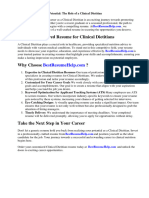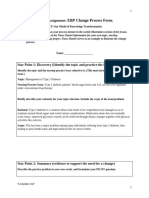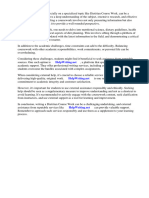Training Program Description
Uploaded by
api-273554555Training Program Description
Uploaded by
api-273554555Running head: TRAINING PROGRAM DESCRIPTION
Training Program Description
Susan Lance
AET/570
November 9, 2015
Charity Jennings
TRAINING PROGRAM DESCRIPTION
Training Program Description
Introduction
The training consultants, at Healthy Choices Wellness Center, have been vastly aware of
the changing demographics and the great impact it will have on the future delivery of quality
care provided to the centers aging patients. It is the decision of the centers executive committee
and stakeholders that to continue to provide top quality patient care in the future a new integrated
approach to patient care will need to be designed for dietitian entrepreneurs. A training program
will need to be implemented to ensure patients acquire the skills and knowledge to incorporate
holistic methods into their skillset.
Management has made the decision to design a Healthy Healing. Workshop to train,
and certify dietitians to become health coaches. The training will provide the resources,
materials, and support needed for dietitians to develop the leadership qualities and skills to
become certified health coaches. A registered dietitian can enhance their credentials by becoming
a certified health coach. Program designers have integrated the two concepts of leadership and
coaching together in four training sessions to demonstrate how they are dependent on one
another to enhance performance development.
A health coach is defined as a wellness authority and supportive mentor who motivates
individuals to cultivate positive health choices (Haskins, 2015).
Scope of Training
The dietitian will learn effective practices, knowledge and skills during training to be
certified as a Health Coach. He or she will be taught whole systems healing, and be able to
apply what was learned when providing care to the client (University of Minnesota, 2013). The
learned behavior and skills will help enhance the dietitian/patient relationship, and enable the
TRAINING PROGRAM DESCRIPTION
dietitian/coach to practice not only traditional care but also incorporate holistic therapies. The
dietitian will be trained to work in numerous delivery models and settings. Such settings shall
include nursing homes, hospitals, educational facilities, and hospitals. Training will include:
Learning the framework of modern complexity theory (Cavanagh & Lane, 2012)
Learning how to incorporate a new holistic approach to the clients lifestyle
(University of Minnesota, 2013)
Learning new strategies for tackling challenging problems
Learning the standard code of ethics for health coaches
Learning when and how to incorporate whole systems healing (University of
Minnesota, 2013)
Training in various dietary theories
Training in lifestyle coaching techniques
If a dietitian is to become a health coach at the Wellness Center he or she must
demonstrate the qualities of a leader and the necessary skills to become a certified health coach.
The course will entail learning effective leadership skills so employees can reach their full
potential. Training dietitians in soft skills to enhance their leadership qualities that will help raise
their performance at the Wellness Center. The soft skills needed to become an effective leader
are communication skills, accountability, and intrapersonal and intrapersonal skills, just to name
a few. Other proficiencies needed are team building, decision making, and strategic planning.
As life expectancy increases the risk of developing a chronic condition rise for the
elderly. By the year 2050, it is estimated that the populace over 65 will double to 90 million
(The Wall Street Journal, 2013) . The estimated conditions will have a huge impact on the
healthcare system. The stakeholders have deemed it financially smart to invest in elderly health
TRAINING PROGRAM DESCRIPTION
prevention care and cater to their needs. If the Wellness Center is to remain competitive, the
business must create the right services to meet the future imperative needs of an aging
population. Management will concisely define the actions needed to meet the health concerns of
tomorrow to align training objectives, with the company vision.
The health coach is a mentor to clients, he or she is not just concerned with eating habits
but encompasses the individuals overall health practices (Haskins, 2015). Some key elements
that encompass a healthy lifestyle are healthy eating, physical activity, spiritual well-being, and a
balanced life (Haskins, 2015). These are just a few of the concepts that will be addressed with
clients. The R.D. mentor works with his or her clients be establishing a plan and to meet fitness
and health related goals. Training will include introducing dietitians to the learning theories that
can be a guide to modifying the behavior of clients (Haskins, 2015). While the dietitian is still
concerned with what the patient consumes, they are there to be a mentor, to be supportive and
provide the necessary resources for their elderly patients to lead a healthy lifestyle, and decrease
the prevalence of disease.
Audience
Registered dietitians who are motivated to enhance their performance development and become
top leaders and mentors in the company will be targeted for this type of training. Registered
dietitians who have adequate experience, training, and a solid background in health sciences and
are experts in nutrition. Dietitians must hold a minimum of a bachelors degree in dietetics.
Dietitians who have excellent performance records, and have exceptional communications skills
when dealing with client issues and health concerns have been deemed a perfect match for this
training workshop.
Program Goals
TRAINING PROGRAM DESCRIPTION
Upon the completion of the workshop, dietitians will focus on the whole person, a trilogy
of mind, body, and spirit. The dietitian becomes the facilitator who locates the resources, gives
support, and guides the client through the process of growth and healing.
Upon the completion of the workshop, dietitians will have the knowledge and skills to
modify their clients overall well-being using an integration of approaches. They will provide a
learning experience where the client is actively engaged in the healing process. The dietitian
provides the client with a supportive structure, and didactic mentoring.
Upon completion of the workshop, the dietitian will be certified as a health coach who
will be a mentor that is empathetic, meets specific needs of the client, and offers an integrated
health care plan, incorporating weight loss, physical activity, and healthy eating, for the overall
wellness of the client.
Upon completion of the workshop, the dietitian will have the knowledge and skills in
leadership, and coaching. The dietitian will gather data, analyze, and be able to make effective
decisions based on conventional and holistic approaches to healthcare.
Upon completion of the workshop, the dietitian should have the communication and
interpersonal skills to exchange information through the various communication channels that
meet the needs of elderly patients.
The goal of the wellness center is to successfully incorporate a new approach to care
(coaching) into the repertoire of the dietitians skill set that increases the quality of care and
patient satisfaction. The center wishes to increase their number of clients and raise their profits
by 20% in the year 2016.
Program Objectives
TRAINING PROGRAM DESCRIPTION
By the end of the program, the dietitian, given a paper and pen should be able to explain
the relationship between nutrition and exercise and interpret how these elements affect weight
management.
By the end of the program, the dietitian, when asked should be able to recite and compare
two dietary theories, and demonstrate how to create a step by step action plan based on one
theory.
By the end of the program, dietitian, when given a blank planner will be able to design an
integrated action plan on a whiteboard, using the whole systems healing process.
By the end of the program, the dietitian, given access to fitness equipment will be able to
demonstrate the practical application of two functional assessments.
By the end of the program, the dietitian will be able to recite the code of ethics within
two tries.
By the end of the program, the Dietitian will be given a pre-designed quiz. In section A,
the dietitian will be able to list six soft skills needed to be an effective mentor, and in section B
given ten multiple choice questions, the dietitian will pick one out of three answers to each
question. The questions will be based on how these skills may be applied in various scenarios.
By the end of the program, the dietitian, given a one-page exam, will be able to choose
the appropriate channel of communication that best suits the need of five clients in 10 question
mix and match exam.
TRAINING PROGRAM DESCRIPTION
7
References
Cavanagh, M., & Lane, D. (2012, March). Coaching psychology coming of age: The challenges
we face in a messy world of complexity. International Coaching Psychology Review,
7(1), 75-88. Retrieved from http://http://www.consciouscooperation.com/wpcontent/uploads/sites/6/2011/12/CAT-869.pdf#page=77
Haskins, S. (2015, February 4). Whats a health coach? Retrieved from
http://health.usnews.com/health-news/blogs/eat-run/2015/02/04/whats-a-health-coach
The Wall Street Journal. (November 29, 2013). How will changing demographics in the U.S.
influence business in the coming decade? Retrieved from
http://www.wsj.com/articles/SB10001424052702303562904579228000262387472
University of Minnesota. (2013, July 2). Whole systems healing. Retrieved from
http://www.csh.umn.edu/program-areas-section/whole-systems-healing/index.htm
You might also like
- Health Coaching - A Powerful Approach To Support Self-Care: BotheredNo ratings yetHealth Coaching - A Powerful Approach To Support Self-Care: Bothered5 pages
- A SMART Objective Is One That Is SPECIFICNo ratings yetA SMART Objective Is One That Is SPECIFIC9 pages
- What Is The Role of Regulatory Agencies in Continuous Quality ImprovementNo ratings yetWhat Is The Role of Regulatory Agencies in Continuous Quality Improvement14 pages
- Cuin 7397 Final Project - Resilience Leadership Grant Application - Cohensuessman FinalNo ratings yetCuin 7397 Final Project - Resilience Leadership Grant Application - Cohensuessman Final13 pages
- 3-9-13-Health-Coaching-An-Opportunity-for-the-Occupational-Health-NurseNo ratings yet3-9-13-Health-Coaching-An-Opportunity-for-the-Occupational-Health-Nurse42 pages
- Catherines Health Center- Health Coaching ToolkitNo ratings yetCatherines Health Center- Health Coaching Toolkit75 pages
- Health Coaching Implementation and Quality Summary Guide PDFNo ratings yetHealth Coaching Implementation and Quality Summary Guide PDF18 pages
- Vision Statement For The Physical Therapy Profession and Guiding Principles To Achieve The VisionNo ratings yetVision Statement For The Physical Therapy Profession and Guiding Principles To Achieve The Vision3 pages
- The Art of Health Coaching: Refining Your Wellness ExpertiseFrom EverandThe Art of Health Coaching: Refining Your Wellness ExpertiseNo ratings yet
- How To Start An Employee Wellness Program Guide - NpsNo ratings yetHow To Start An Employee Wellness Program Guide - Nps24 pages
- Relationship Btween PT Nad PT and Health Care ProfessionNo ratings yetRelationship Btween PT Nad PT and Health Care Profession15 pages
- CHW Training Manual FINAL Complete10.30.13No ratings yetCHW Training Manual FINAL Complete10.30.13178 pages
- To Become The World's Best Tertiary Healthcare ProviderNo ratings yetTo Become The World's Best Tertiary Healthcare Provider13 pages
- Lecture 11 Functinal English Nur 3rd Sec A & BNo ratings yetLecture 11 Functinal English Nur 3rd Sec A & B11 pages
- Health Coaching in Focus One - Pager - 2019No ratings yetHealth Coaching in Focus One - Pager - 20191 page
- Wepik Nurturing The Nurturers A Professional Approach To Self Care For Healthcare Professionals 20240201122258T6pHNo ratings yetWepik Nurturing The Nurturers A Professional Approach To Self Care For Healthcare Professionals 20240201122258T6pH12 pages
- Key Takeaways Handout - Improving Patient Community HealthNo ratings yetKey Takeaways Handout - Improving Patient Community Health2 pages
- Four Strategies For Promoting Healthy Lifestyles in Your Practice - Family Practice ManagementNo ratings yetFour Strategies For Promoting Healthy Lifestyles in Your Practice - Family Practice Management4 pages
- Advanced Course Work in Therapeutic Nutrition100% (2)Advanced Course Work in Therapeutic Nutrition8 pages
- Instructional Plan and Presentation Phase 4No ratings yetInstructional Plan and Presentation Phase 42 pages
- Instructional Plan and Presentation Phase 4 1No ratings yetInstructional Plan and Presentation Phase 4 12 pages
- Instructional Plan and Presentation Phase 3No ratings yetInstructional Plan and Presentation Phase 34 pages
- Instructional Plan and Presentation Phase 2No ratings yetInstructional Plan and Presentation Phase 25 pages
- Sekolah Kluster Kecemerlangan (SKK) : Prepared By: Sitiliyanabtomar NiknurisyabtmohdkamarolzamanNo ratings yetSekolah Kluster Kecemerlangan (SKK) : Prepared By: Sitiliyanabtomar Niknurisyabtmohdkamarolzaman9 pages
- Understanding The Self: Introduction and Module 1 "Getting To Know You: My Home, My School"No ratings yetUnderstanding The Self: Introduction and Module 1 "Getting To Know You: My Home, My School"10 pages
- Algebra Cheat Sheet: Basic Properties & FactsNo ratings yetAlgebra Cheat Sheet: Basic Properties & Facts4 pages
- History and Theory - Is Restoration Actually Modern?No ratings yetHistory and Theory - Is Restoration Actually Modern?2 pages
- How To Record A Guitar Track Using Adobe Audition 1No ratings yetHow To Record A Guitar Track Using Adobe Audition 110 pages
- Productivity Improvement of A Assembly LineNo ratings yetProductivity Improvement of A Assembly Line88 pages
- Master in Theoretical and Practical Application of FEM and CAE SimulationNo ratings yetMaster in Theoretical and Practical Application of FEM and CAE Simulation20 pages
- Oral Presentations: Signalling and Transition Words: Language For The Introduction of An Oral PresentationNo ratings yetOral Presentations: Signalling and Transition Words: Language For The Introduction of An Oral Presentation3 pages
- Marketing Assignment Case Study On Heinz WattieNo ratings yetMarketing Assignment Case Study On Heinz Wattie10 pages
- Health Coaching - A Powerful Approach To Support Self-Care: BotheredHealth Coaching - A Powerful Approach To Support Self-Care: Bothered
- Mastering Health Coaching: A Holistic Approach to WellnessFrom EverandMastering Health Coaching: A Holistic Approach to Wellness
- What Is The Role of Regulatory Agencies in Continuous Quality ImprovementWhat Is The Role of Regulatory Agencies in Continuous Quality Improvement
- Cuin 7397 Final Project - Resilience Leadership Grant Application - Cohensuessman FinalCuin 7397 Final Project - Resilience Leadership Grant Application - Cohensuessman Final
- 3-9-13-Health-Coaching-An-Opportunity-for-the-Occupational-Health-Nurse3-9-13-Health-Coaching-An-Opportunity-for-the-Occupational-Health-Nurse
- Health Coaching Implementation and Quality Summary Guide PDFHealth Coaching Implementation and Quality Summary Guide PDF
- Vision Statement For The Physical Therapy Profession and Guiding Principles To Achieve The VisionVision Statement For The Physical Therapy Profession and Guiding Principles To Achieve The Vision
- The Art of Health Coaching: Refining Your Wellness ExpertiseFrom EverandThe Art of Health Coaching: Refining Your Wellness Expertise
- How To Start An Employee Wellness Program Guide - NpsHow To Start An Employee Wellness Program Guide - Nps
- Relationship Btween PT Nad PT and Health Care ProfessionRelationship Btween PT Nad PT and Health Care Profession
- To Become The World's Best Tertiary Healthcare ProviderTo Become The World's Best Tertiary Healthcare Provider
- Wepik Nurturing The Nurturers A Professional Approach To Self Care For Healthcare Professionals 20240201122258T6pHWepik Nurturing The Nurturers A Professional Approach To Self Care For Healthcare Professionals 20240201122258T6pH
- Key Takeaways Handout - Improving Patient Community HealthKey Takeaways Handout - Improving Patient Community Health
- Four Strategies For Promoting Healthy Lifestyles in Your Practice - Family Practice ManagementFour Strategies For Promoting Healthy Lifestyles in Your Practice - Family Practice Management
- Elevating Your Health Coaching: Mastery in Wellness GuidanceFrom EverandElevating Your Health Coaching: Mastery in Wellness Guidance
- Sekolah Kluster Kecemerlangan (SKK) : Prepared By: Sitiliyanabtomar NiknurisyabtmohdkamarolzamanSekolah Kluster Kecemerlangan (SKK) : Prepared By: Sitiliyanabtomar Niknurisyabtmohdkamarolzaman
- Understanding The Self: Introduction and Module 1 "Getting To Know You: My Home, My School"Understanding The Self: Introduction and Module 1 "Getting To Know You: My Home, My School"
- History and Theory - Is Restoration Actually Modern?History and Theory - Is Restoration Actually Modern?
- How To Record A Guitar Track Using Adobe Audition 1How To Record A Guitar Track Using Adobe Audition 1
- Master in Theoretical and Practical Application of FEM and CAE SimulationMaster in Theoretical and Practical Application of FEM and CAE Simulation
- Oral Presentations: Signalling and Transition Words: Language For The Introduction of An Oral PresentationOral Presentations: Signalling and Transition Words: Language For The Introduction of An Oral Presentation




































































































